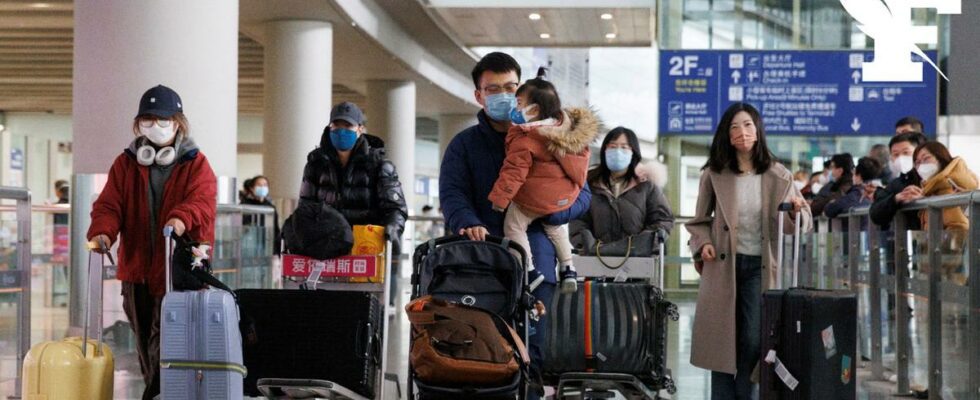After three years of draconian restrictions, China abruptly lifted most of its pandemic measures last December.
China is lifting mandatory quarantine for travelers from overseas on Sunday, January 8, ending three years of self-imposed isolation just as it faces a spike in Covid-19 cases at home.
After three years of some of the most draconian restrictions in the world, which weighed on its economy and ended up sparking protests across the country, China last month abruptly lifted most of its measures to fight the pandemic.
Last act of this dismantling: the end, this Sunday, of strict quarantines in dedicated hotels to which, since March 2020, all people arriving from abroad have been required to submit.
Increase in bookings
Initially three weeks, the duration of this quarantine had already been reduced to one week last summer, then to five days in November. The announcement in December of the end of the quarantine prompted the Chinese to make many plans to travel abroad, with a dramatic increase in traffic on booking sites.
Read alsoIn China, everything is played on the exit of the Covid
At Shanghai’s Pudong International Airport, a woman named Pang told AFP she was pleased with the loosening of the rules. “I think it’s really good that the policy has changed now“, she rejoiced. “It’s a necessary step, I think. The Covid has normalized now and after this obstacle everything will be fine“, she added.
“Unacceptable” restrictions
But the prospect of a massive influx of Chinese tourists has prompted more than a dozen countries to impose screening tests on travelers from China, where the number of contaminations has exploded since the policy’s abrupt end.zero covidrelentlessly carried out for three years. Beijing has condemned the travel restrictions imposed on its nationals as “unacceptable”, although China itself has remained largely closed since 2020 to foreign tourists and international students.
Following a crisis meeting of European Union experts on Wednesday, member states were “strongly encouragedto screen visitors from the most populous country in the world. And the Netherlands and Portugal on Friday became the latest countries to require passengers arriving from China to present a negative Covid-19 test upon arrival.
Read also“At least we dared to speak, while everyone was silent”: the great awakening of young Chinese in the face of Xi Jinping
The outbreak is expected to worsen ahead of the Chinese New Year holiday in late January, when millions are expected to leave hard-hit megacities for the countryside to visit their often elderly relatives. and vulnerable. And China has taken steps to limit criticism of its chaotic journey to exit its policy.zero covid“. Weibo, China’s Twitter, said it recently banned 1,120 accounts for “offenses against experts and scholars“.
In the southwest of the country, workers clashed with police at a Covid test kit factory, according to video posted on social media on Sunday. A man who posted video of the scene, which took place according to AFP geotagged footage at an industrial park in Chongqing, said many workers had not been paid. According to other publications, the Chongqing-based pharmaceutical company Zybio suddenly laid off workers who had been recruited in recent weeks.
“Come out like this”
At Beijing airport on Sunday, the barriers that separated international arrivals from domestic arrivals disappeared, as did staff in protective suits, an essential part of life in China’s “zero covid“. And at Shanghai airport, a man named Yang who was arriving from the United States said he was unaware the rules had changed. “I had no idea“, he is surprised to AFP.
Read alsoXi Jinping’s supremacy shaken by the anti-containment sling
“I would consider myself extremely lucky if I only had to do a two-day quarantine, but it turns out I don’t have to do quarantine at all, and no paperwork, we went out like this, just like before“, he added.
An expected influx of visitors
Major tourist destinations in Asia are expecting an influx of Chinese visitors. In Seoul, Son Kyung-rak is already preparing to welcome a tide of Chinese travellers. “Looking to hire and increase inventory“, he says on his pancake stand located in the Myeongdong district. “Chinese tourists are our first customers, the more the merrier“.
In Tokyo, cartoonist Masashi Higashitani is brushing up on his knowledge of Mandarin in anticipation of the return of his Chinese clients. But although eager to find these tourists, he says “also fear that we have to be more careful about anti-virus measures“.
Hong Kong opens
In Hong Kong, strict travel restrictions to and from the rest of China also eased on Sunday. Hong Kong’s recession-hit economy is desperate to return to growth, and families are eagerly awaiting Chinese New Year reunions.
Up to 50,000 Hong Kongers can now cross the border daily at three land checkpoints after registering online. In addition, another 10,000 people are allowed to enter by sea, air or bridge without needing to register in advance, Chief Executive John Lee said.
On Sunday at the Lok Ma Chau checkpoint near the city of Shenzhen, a student from mainland China, named Zeng, told AFP he was happy to be able to cross without further restrictions. “I’m happy as long as I don’t have to be quarantined – it was so unbearable“Says Zeng to AFP. He says he was confined to his quarantine room, where the internet signal was weak, for 21 days the last time he visited the mainland in early 2022.
SEE ALSO – Covid: statistics published by China do not reflect epidemic recovery according to WHO
